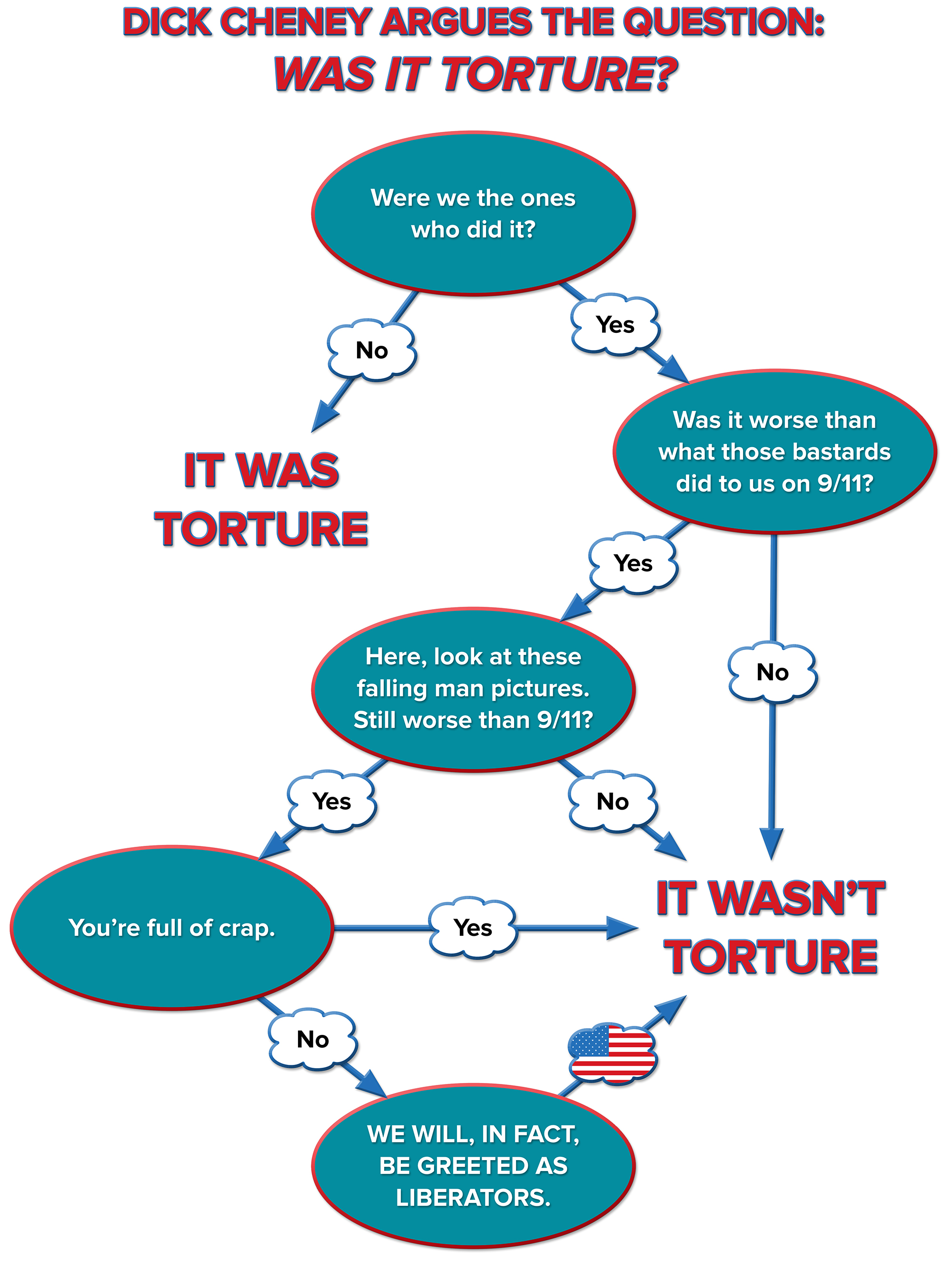
terrorism
DiFi tortures the CIA
Here’s an email I just sent to everyone in my firm:
| The report of the Senate Select Committee on Intelligence was released a few minutes ago. It can be downloaded here. Everyone should read as much of it as they can bear. |
| Barest summary of the report: In the years after 9/11, the CIA systematically tortured terror suspects and other detainees pursuant to orders from the Executive branch. Senior members of the Bush Administration (presumably including Vice President Cheney) committed war crimes, in knowing violation of both international and US law, under cover of deliberately shoddy and misleading legal advice from, among others, a sitting Federal judge. No one will be prosecuted. |
| The report’s most important conclusion: The torture yielded no actionable intelligence, a fact that should finally put an end to the specious arguments about ends and means. That torture doesn’t “work” is not a surprise. Torture isn’t, and wasn’t, about extracting information. It is, and was, about power, revenge, rage and cruelty. Certainly, torture isn’t a sign of strength, or moral clarity in the face of existential danger. It’s a sign of fear and, ultimately, weakness. |
| Justification for this email: If a meaningful distinction can be made between “law” and “politics” – and, by extension, between what is and what is not appropriate for workplace discussion – my considered judgment is that the attached Senate report is concerned with issues of law. At the very least, the report (in its discussions of the Yoo and Bybee memos) highlights the ethical lapses lawyers can commit when pressured by important clients to reach a favorable conclusion. |
| Jeff |
Hamas projected to win Israel elections
In this morning’s Washington Post, Daoud Kuttab describes how the Israeli airstrikes in Gaza have succeeded in rescuing Hamas from the political wilderness:
The lack of international support since the 2006 elections, followed by this rebuff to Gaza’s only Arab neighbor, Egypt, compounded the deterioration of Hamas’s internal support. By November, the survey showed, only 16.6 percent of Palestinians supported Hamas, compared with nearly 40 percent favoring Fatah. The decline in support for Hamas has been steady: A year earlier, the same pollster showed that Hamas’s support was at 19.7 percent; in August 2007, it was at 21.6 percent; in March 2007, it was at 25.2 percent; and in September 2006, backing for the Islamists stood at 29.7 percent.
While it is not apparent how this violent confrontation will end, it is abundantly clear that the Islamic Hamas movement has been brought back from near political defeat while moderate Arab leaders have been forced to back away from their support for any reconciliation with Israel.
That’s why, as the six-month cease-fire with Israel came to an end, Hamas calculated — it seems correctly — that it had nothing to gain by continuing the truce; if it had, its credentials as a resistance movement would have been no different from those of Mahmoud Abbas’s Fatah. Unable to secure an open border and an end to the Israeli siege, while refusing to share or give up power to Abbas, Hamas could have had no route to renewed public favor.
For different reasons, Hamas and Israel both gave up on the cease-fire, preferring instead to climb over corpses to reach their political goals. One side wants to resuscitate its public support by appearing to be a heroic resister, while the other, on the eve of elections, wants to show toughness to a public unhappy with the nuisance of the Qassam rockets.
The disproportionate and heavy-handed Israeli attacks on Gaza have been a bonanza for Hamas. The movement has renewed its standing in the Arab world, secured international favor further afield and succeeded in scuttling indirect Israeli-Syrian talks and direct Palestinian-Israeli negotiations. It has also greatly embarrassed Israel’s strongest Arab neighbors, Egypt and Jordan.
As cynical political calculations go, all of this is almost disappointingly obvious. The formerly ascendant parties, Hamas and Kadima, lose ground to their legacy rivals (Fatah and Likud, respectively). The cease-fire’s end and the approaching elections coincide, providing a campaign opportunity for both sides. Hamas offers a casus belli with rockets. Israel’s governing coalition returns the favor with a massive aerial bombardment, hoping to prove that Kadima’s Livni and Labor’s Barak can be just as mindlessly barbaric as Likud’s Netanyahu. Meanwhile, the collectively punished residents of Gaza rally around Hamas.
Hamas seems clearly the winner here, with things looking not so good for Kadima. I’m predicting a stalemate on the ground in Gaza followed by a narrow victory at the polls for Likud.
Lawyers, war criminals and the Federalist Society
From the declassified summary of the Senate Armed Services Committee’s “Inquiry Into the Treatment of Detainees in U.S. Custody” —
The abuse of detainees in U.S. custody cannot simply be attributed to the actions of “a few bad apples” acting on their own. The fact is that senior officials in the United States government solicited information on how to use aggressive techniques, redefined the law to create the appearance of their legality, and authorized their use against detainees. Those efforts damaged our ability to collect accurate intelligence that could save lives, strengthened the hand of our enemies, and compromised our moral authority.
Someone remind me again why war crimes trials are a non-starter. And if so, why the Bush-Cheney gang can’t just be prosecuted for fraud, or for treason. Can’t we just sue John Yoo and Jay Bybee for malpractice and have them disbarred? Is that too much to ask?

